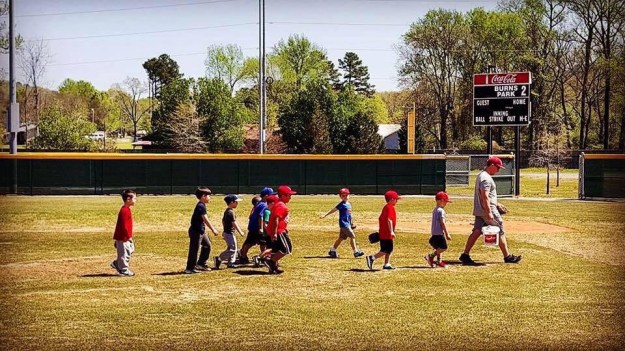 As the days grow longer and warmer and the stubborn beige tones of winter’s dormant grass give way to slivers of green on fields in ballparks across the country, we usher in a season full of sights and sounds enjoyed by millions. Baseball is upon us. With it comes it’s lovable little brother; tee ball.
As the days grow longer and warmer and the stubborn beige tones of winter’s dormant grass give way to slivers of green on fields in ballparks across the country, we usher in a season full of sights and sounds enjoyed by millions. Baseball is upon us. With it comes it’s lovable little brother; tee ball.
For many, the freshly cut grass, fields chalked to perfection and little ones stumbling in and out of the dugout signifies the beginning of their favorite time of year. Aware that this time will pass all too quickly, giddy moms and proud dads snap pictures at a frenetic pace, making sure they have documented the moment. Grandparents and siblings lean into the fence to watch their little player overcome nerves, block out the noise, hit the ball and hustle down the line. These are good times. However, for the men and women responsible for organizing this endearing and entertaining chaos, it can signify something very different: stress, frustration and elevated blood pressure.
A close friend of mine who coaches baseball at a high level once told me that you aren’t a real baseball coach unless you’ve coached tee ball. I don’t share his breadth of experience in coaching, but I have coached enough seasons of youth baseball to know that I agree wholeheartedly. Not for the knowledge required, but for the sheer unpredictability of it all. It is a task replete with its own unique challenges. Whether you are a seasoned youth coach, played a little ball in your day, or are just a well-intentioned dad in his first year of coaching, odds are you will be facing adversity of some type very soon.
Among the unique challenges in coaching tee ball is the requirement of 4, 5 and 6-year-olds to stand relatively still when the action is slow – and for position players in tee ball, the action can be painfully slow. Unlike soccer, where children are constantly entertained by chasing a brightly colored moving target, tee ball players are asked to stand still, watch the ball and wait for it to come their way. For some players, that wait may last several innings or in some cases, games.
In other words, tee ball lacks the instant gratification kids today demand and usually receive in all other aspects of life. Patience is essential in this sport, but that’s a difficult trait to come by at their ages. Nonetheless, it is a great game that can be enjoyed by all if the coach can keep things in perspective and help them keep their eyes on the ball. Literally.
Here is what I have learned in my years as a tee ball coach.
Stay Organized
The most important job of a tee ball coach is just being there. In many leagues, very little is expected from the coach other than holding a few practices and keeping things loosely organized on game days. In other leagues, it may be much more competitive. Regardless, I would encourage you to do more than what is asked of you.
Your players are going to vary greatly in terms of ability and personality, as will their parents. Expectations abound in youth sports, and tee ball is certainly no exception. While it is impossible to be all things to all people, you can certainly minimize the number of misunderstandings or conflicts by communicating well with all of your parents. Explain your philosophy and your strategy on the front end, and you and your parents will enjoy a much smoother emotional ride for the rest of the season. (The misunderstandings come in all shapes and sizes).
First and foremost, make your self available to your parents and keep them well informed. You may be blessed with the greatest players and parents to ever enter a ballpark, or you may have a hodgepodge of personalities from all walks of life. Either way, you owe it to them to maintain regular contact and keep them in the loop on all things tee ball; schedules, uniforms, weather delays/closings, pictures, drinks/snacks, etc.
Set a practice schedule and hold yourself to it. If your league provides ample field time to practice, take advantage of it. If space is at a premium in your park, then try to have a plan for holding practices elsewhere. In most cities, you can utilize the fields at churches, schools, even undeveloped commercial real estate, if needed. In some instances, you may even rent space at an indoor facility. While I have never done this for a tee ball team, it could be necessary in periods of prolonged inclement weather. Don’t wait until two or three weeks into the season to try and figure this out.
Practice, Practice, Practice
This may sound like overkill, but my theory on practice schedules in tee ball (or any other level) is that I would rather offer too much and have players not attend, than offer too little and have parents want more. I have had parents complain both ways – that we were practicing too little and that we were practicing too much. Usually though, whether they want more or less practice, most parents would like to see their child improve. What I do is offer a couple of practices a week leading up to the season. Once the season begins, I hold a scheduled practice each week and (depending on the game schedule) another voluntary practice each week. That said, I also make it clear that all tee ball is essentially voluntary and I’m not going to hold it against any player if they miss practice or games. If you want to come, great. If you don’t great. But there is no question that, by the end of the season, it will be obvious which players have participated the most. Which brings me to my next point.
There is no substitute for repetitions. This applies in the field and at the plate. Any kid that gets enough reps will improve. You may bring a vast knowledge of hitting mechanics and a plethora of drills with you to the game of tee ball. I strongly encourage you to dial it back a notch (or twelve). Leave the agility ladder at home and boil whatever you know about the game down to a few simple ideas. If you don’t have a practice plan, a quick internet search will produce several that should suffice, but I can probably save you the time. Field grounds balls. Throw to first. Hit the ball.
Make sure you keep them moving (stations work very well at this and any other level). Also, you will quickly discover that first base is the most important position on the field in tee ball. Put your best glove there. If your league requires you to rotate, have at least a few kids that can catch and play the position. I can not stress this enough; make sure that you have a player that can play this position.
Make It Fun
Your league may or may not keep score. Like me, you likely have an opinion on which you prefer, but that’s a topic for another day. If you don’t keep score, make it fun. If you do keep score, make it fun. If your goal as a tee ball coach is turn each of your players into a “beast” or a “machine,” stop reading now and go find some older kids to coach. Our number one job at this age is to make sure that these kids love the game and to make sure that it feels like a game. Make sure that your players want to come back to the ballpark. If you are doing everything right, they will look forward to both practices and games. The beasts and machines will reveal themselves with or without you, so just make sure everyone is smiling.
Managing Personalities and Positions
Hopefully you are blessed with good players and good parents. Oddly enough though, there are many that don’t fall into the “good” category. Most disagreements with parents stem from your coaching style, your demeanor or the position their kid is playing. I manage this by rotating positions regularly and making an effort to give every player a chance to make plays. Some leagues may require you to do this. If not, I would encourage it. The only exception I make is first base and, to a lesser extent, pitcher. The reason being that there is usually a player or two that could get hurt because their skills and attention span just aren’t there yet. Again, tell them on the front end how you plan to manage a lineup and what your overall strategy is and you can avoid ruffling feathers as the season progresses.
You are going to be coaching some children that don’t have the attention span to stay “dialed in.” You are going to coach children that are only there because their parents are making them be there. You will also coach kids that just don’t care. All of these are common in youth sports. My only advice is to try to keep them moving, keep them entertained and try to put a smile on their face. And, if they are not the least bit athletically inclined, try to keep them out of harm’s way. If their parents ask how they are doing, be honest. Not rude, but honest. There is nothing wrong with you telling a parent that their kid hates being out there. There are plenty of successful people in this world that hated tee ball as a kid.
Keep Your Competitive Side In Check
If you aren’t overly competitive, this won’t be an issue. If you are, you may be in for a long season. Adults can ruin a child’s experience and literally scar them for life if they aren’t able to keep their emotions in check. This should go without saying, but just don’t be that adult. You are going to get frustrated, you are going to have calls go the other way, you are going to have another coach/umpire/parent push your buttons. Take the high road, the stakes are not high in tee ball.
Enjoy The Game
If you get past the hustle and bustle of hurrying your child to and from the park, the added stress on what is likely an already busy schedule and the kindergartners that just won’t listen, you will realize that a ballpark is an amazing place to spend an evening. Most nights after we’ve played a game, I have a moment in which it dawns on me how much I love being there. The field is empty but the lights are on. Voices grow fainter as they head for the gate. As I gather my equipment in the dugout, I forget how hard it was to get out of my office that day and I forget the helplessness I felt while plugging through the miserable traffic on the way to pick my kids up from school. I see the smile on my son’s face. It’s just me and him now and I know that that the inconveniences were worth it. I am exactly where I am supposed to be.
When my wife and I had our second child, my brother, with a tinge of regret in his voice, advised me to take it all in. Having raised two boys of his own, he knew very well how fast the moments with my children were about to pass.. “The days are long but the years are short,” he said. I know now what he meant. Truer words have never been spoken, especially when it comes to tee ball.






